
support@yorubalibrary.com
+2348073529208, 07038599574

Ajeobale, known scientifically as Croton zambesicus, is a widely known plant in Yoruba traditional medicine. Commonly found in the savannas and forested regions of West Africa especially Nigeria, this plant is unique for its multi-function applications in promoting health and spiritual protection. In Yoruba communities, Ajeobale is often planted around homes, believed to serve as a shield against negative spiritual influences. Beyond its spiritual significance, Ajeobale is utilized for its medicinal properties. 
Traditional healers use various parts of the plant to address ailments such as hypertension, dysentery, fever, and convulsions. Its leaves, in particular, are used to prepare decoctions and topical applications aimed at treating infections and promoting overall well-being.
Key Facts
Category: Leaf
Botanical Name: Croton zambesicus
Common Name: Nil
Yoruba name: Ewe Ajeobale
Igbo Name: Nil
Hausa Name: Nil
Characteristics of Ajeobale
• Growth Habit:
Ajeobale is a shrub or small tree that can grow up to 16 meters in height. It thrives in savanna and forest regions, particularly in West Africa.
• Leaves:
The leaves are simple, alternate, and have a distinctive aroma when crushed.
• Bark:
The bark emits an aromatic scent when slashed, and infusions made from it are traditionally used in treating malaria.
• Flowers:
The plant produces small, inconspicuous flowers.
Want to treat common ailments such as Malaria, Cough, Measles, Typhoid, Pile etc naturally without spending much? Grab a copy of Authentic Herbal Solutions: 15 Common Ailments & Their Natural Cures. A practical eBook recommended for everyone regardless of tribe, religion or association. Order below or Download sample here
AUTHENTIC HERBAL SOLUTION #4KOne Yoruba proverb says "Bí olóde ò kú, òde rè kì í wu Gbégi". Do you know that Gbégi is actually a leaf/plant? Get Yoruba Proverbs on Plants and Herbs, which is a collection of Untold Wisdoms Hidden in Leaf and plants comprising their Life Applications & Moral Teachings. Order below or download sample here
YORUBA PROVERBS ON PLANTS #4KTraditional and Medicinal Uses in Yoruba Land
1. Spiritual Protection
Ajeobale is traditionally planted around homes to ward off negative spiritual influences and is used in rituals aimed at protection and cleansing.
2. Treatment of Hypertension
Decoctions made from the leaves are consumed to help manage high blood pressure.
3. Management of Dysentery
Leaf decoctions are taken internally or used as washes to treat dysentery and related gastrointestinal issues.
4. Fever and Convulsions
Infusions prepared from the plant are used in managing fevers and convulsions, especially in traditional settings.
5. Antimicrobial Applications
Studies have shown that extracts from Croton zambesicus possess antimicrobial properties effective against certain bacterial strains.
Healing Properties of Ajeobale
• Antimicrobial: Effective against certain bacteria, aiding in the treatment of infections.
• Antihypertensive: Helps in managing high blood pressure.
• Antipyretic: Used in reducing fevers.
• Anticonvulsant: Traditionally employed in managing convulsions.
• Spiritual Cleansing: Used in rituals for protection and cleansing.
Conclusion
Ewe Ajeobale (Croton zambesicus) has a prominent place in Yoruba traditional medicine, valued for both its spiritual significance and medicinal properties. From serving as a protective plant around homes to its applications in treating various ailments and many more.
Have you heard of our Yoruba Herb Dictionary? This contains names of Yoruba Leaf, Roots, Barks, Characteristics, Properties & Identification with HD Pictures. Order below or download sample here
A-Z HERBS & LEAF DICTIONARY #4K
Know more about the Yoruba traditional uses and he…

Learn about Ewe Aran, a potent Yoruba medicinal le…